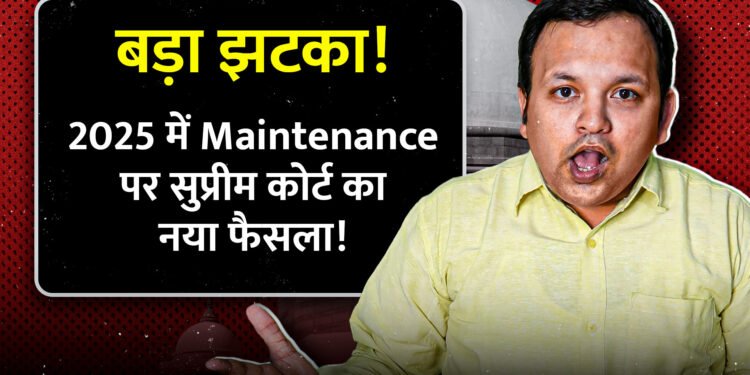Introduction
The Supreme Court of India has delivered a landmark judgment in RINA KUMARI @ RINA DEVI @ REENA v. DINESH KUMAR MAHTO @ DINESH KUMAR MAHATO (2025 INSC 55), clarifying the complex interplay between a decree for restitution of conjugal rights and a wife’s right to maintenance under Section 125 of the Code of Criminal Procedure, 1973 (Cr.P.C.). This ruling addresses a critical question: does a husband’s success in obtaining a restitution decree automatically bar a wife from claiming maintenance if she refuses to return? The apex court’s decision provides much-needed clarity, ensuring that wives are not unjustly deprived of their maintenance rights.
To learn more about the topic, read the blog till the end, and if there lies any more doubt, feel free to reach out to us at; https://thelegalshots.com/legal-opinion/
Facts of the Case
The appellant, Rina Kumari (Reena), and the respondent, Dinesh Kumar Mahto, were involved in a marital dispute that led to their separation. Dinesh obtained a decree for restitution of conjugal rights, compelling Reena to return to the matrimonial home. When Reena did not comply, Dinesh used this decree to oppose her maintenance claim under Section 125 CrPC. The Jharkhand High Court initially ruled in favor of Dinesh, stating that Reena’s refusal to comply with the restitution decree amounted to “refusal to live with the husband without sufficient reason,” as per Section 125(4) CrPC, thus denying her maintenance. Reena, aggrieved by this decision, appealed to the Supreme Court, which ultimately overturned the High Court’s ruling, restoring her right to maintenance.
Supreme Court’s Interpretation: Beyond Technicalities
The Supreme Court held that a decree for restitution of conjugal rights does not automatically bar a wife from claiming maintenance under Section 125 CrPC. The Court emphasized that the critical question is whether the wife had “sufficient reason” to refuse to live with her husband. The Court’s interpretation focused on the following key points:
- Distinct Proceedings: Maintenance proceedings under Section 125 CrPC and restitution proceedings under the Hindu Marriage Act are distinct. A civil decree for restitution does not automatically negate a maintenance claim.
- Sufficient Reason: The Court examined whether Reena had legitimate reasons to refuse to comply with the restitution decree. Evidence of mental cruelty, lack of support during a miscarriage, and inadequate living conditions were considered.
- Nature of Maintenance: The Court reiterated that maintenance proceedings are essentially civil in nature, aimed at preventing destitution and ensuring a dignified life.
- Evidentiary Scrutiny: The Court scrutinized the evidence presented, emphasizing that mere non-compliance with a decree does not equate to a “refusal without sufficient reason.”
Legal Provisions Involved
- Section 125 Cr.P.C.: Provides for maintenance to wives, children, and parents to prevent destitution.
- Section 125(4) Cr.P.C.: Bars maintenance if the wife refuses to live with her husband without sufficient reason.
- Section 9 of the Hindu Marriage Act, 1955: Governs restitution of conjugal rights.
- Indian Evidence Act, 1872: Sections 40-43 discuss the relevance and conclusiveness of civil judgments in subsequent proceedings.
Key Takeaways
- A decree for restitution of conjugal rights does not automatically bar a wife’s maintenance rights.
- Courts must examine the reasons behind a wife’s refusal to comply with a restitution decree.
- Evidence of cruelty, neglect, and unmet marital obligations can justify a wife’s refusal to live with her husband.
- Section 125 of Cr.P.C. is for the prevention of vagrancy and destitution.
- Maintenance proceedings are civil in nature.
- “Refusal” under section 125(4) of Cr.P.C. has a specific legal meaning, and is not the same as simple failure to return to the matrimonial home.
Conclusion: A Step Towards Equitable Marital Laws
The Supreme Court’s decision in RINA KUMARI @ RINA DEVI @ REENA v. DINESH KUMAR MAHTO @ DINESH KUMAR MAHATO marks a significant step towards ensuring equitable application of marital laws. By clarifying the interplay between restitution decrees and maintenance rights, the Court has reinforced the principle that justice must prevail over technical legalities. This judgment will serve as a crucial precedent in future cases, ensuring that vulnerable spouses are not unfairly deprived of their maintenance rights.
Recent Study
Recent studies by legal scholars and women’s rights organizations in India have highlighted the challenges faced by women in accessing maintenance under Section 125 CrPC. These studies emphasize the need for judicial interpretations that prioritize the protection of women’s rights and prevent the misuse of legal technicalities to deny them essential support. These studies have also shown that the economic independence of women is a key factor in their ability to leave abusive relationships. The supreme court decision in this case, helps to further that independence.
Related Landmark Judgments
- Chaturbhuj vs. Sita Bai – Maintenance is a social justice measure to prevent vagrancy.
- Bhuwan Mohan Singh v. Meena – Maintenance must provide dignity, not just subsistence.
- Rajnesh v. Neha – Comprehensive guidelines on maintenance rights.
- Rohtash Singh vs. Ramendri (Smt.) – Maintenance rights of a divorced wife.
- Kirtikant D. Vadodaria v. State of Gujarat – Interpretation of ‘refusal’ under Section 125(4) Cr.P.C.
If doubts still persist, contact our Legal Experts at https://thelegalshots.com/legal-opinion/




